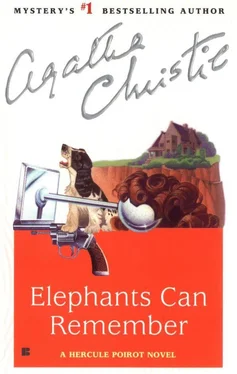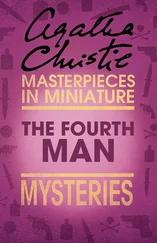Agatha Christie - Elephants Can Remember
Здесь есть возможность читать онлайн «Agatha Christie - Elephants Can Remember» весь текст электронной книги совершенно бесплатно (целиком полную версию без сокращений). В некоторых случаях можно слушать аудио, скачать через торрент в формате fb2 и присутствует краткое содержание. Год выпуска: 2004, ISBN: 2004, Издательство: Berkley, Жанр: Классический детектив, на английском языке. Описание произведения, (предисловие) а так же отзывы посетителей доступны на портале библиотеки ЛибКат.
- Название:Elephants Can Remember
- Автор:
- Издательство:Berkley
- Жанр:
- Год:2004
- ISBN:ISBN-13: 978-0425067826
- Рейтинг книги:3 / 5. Голосов: 1
-
Избранное:Добавить в избранное
- Отзывы:
-
Ваша оценка:
- 60
- 1
- 2
- 3
- 4
- 5
Elephants Can Remember: краткое содержание, описание и аннотация
Предлагаем к чтению аннотацию, описание, краткое содержание или предисловие (зависит от того, что написал сам автор книги «Elephants Can Remember»). Если вы не нашли необходимую информацию о книге — напишите в комментариях, мы постараемся отыскать её.
Elephants Can Remember — читать онлайн бесплатно полную книгу (весь текст) целиком
Ниже представлен текст книги, разбитый по страницам. Система сохранения места последней прочитанной страницы, позволяет с удобством читать онлайн бесплатно книгу «Elephants Can Remember», без необходимости каждый раз заново искать на чём Вы остановились. Поставьте закладку, и сможете в любой момент перейти на страницу, на которой закончили чтение.
Интервал:
Закладка:
"Oh!" Celia sprang forward.
She went towards the woman and her face had lit up.
"Zelle!" she said. "It is Zelle? It is really Zelle! Oh, I am so pleased. I didn't know you were coming."
"Monsieur Hercule Poirot asked me to come."
"I see," said Celia. "Yes, yes, I suppose I see. But I-I didn't-" she stopped. She turned her head and looked at the handsome boy standing beside her. "Desmond, was it-was it you?"
"Yes. I wrote to Mademoiselle Meauhourat-to Zelle, if I may still call her that."
"You can always call me that, both of you," said Zelle. "I was not sure I wanted to come. I did not know if I was wise to come. That I still do not know, but I hope so."
"I want to know," said Celia. "We both want to know.
Desmond thought you could tell us something."
"Monsieur Poirot came to see me," said Zelle. "He persuaded me to come today." Celia linked her arm in Mrs. Oliver's.
"I wanted you to come, too, because you put this in hand, didn't you? You got Monsieur Poirot and you found out some things yourself, didn't you?"
"People told me things," said Mrs. Oliver; "people whom I thought might remember things. Some of them did remember things. Some of them remembered them right and some of them remembered them wrong. That was confusing. Monsieur Poirot says that that does not really matter."
"No," said Poirot, "it is just as important to know what is hearsay and what is certain knowledge. Because from one you can learn facts even if they are not quite the right facts or had not got the explanation that you think they had. With the knowledge that you got for me, madame, from the people whom you designated elephants-" He smiled a little.
"Elephants?" said Mademoiselle Zelle.
"It is what she called them," said Poirot.
"Elephants can remember," explained Mrs. Oliver. "That was the idea I started on. And people can remember things that happened a long time ago just like elephants can. Not all people, of course, but they can usually remember something. There were a lot of people who did. I turned a lot of the things I heard over to Monsieur Poirot and he-he has made a sort of-oh, if he was a doctor I should call it a sort of diagnosis, I suppose."
"I made a list," said Poirot. "A list of things that seemed to be pointers to the truth of what happened all those years ago.
I shall read the various items to you to see perhaps if you who were concerned in all this feel that they have any significance.
You may not see their significance or you may see it plainly."
"One wants to know," said Celia. "Was it suicide, or was it murder? Did somebody-some outside person-kill both my father and my mother, shoot them for some reason we don't know about, some motive. I shall always think there was something of that kind or something else. It's difficult, but-"
"We will stay here, I think," said Poirot. "We will not go into the house as yet. Other people have lived in it and it has a different atmosphere. We will perhaps go in if we wish when we have finished our court of inquiry here."
"It's a court of inquiry, is it?" said Desmond.
"Yes. A court of inquiry into what happened." He moved towards some iron seats which stood near the shelter of a large magnolia near the house. Poirot took from the case he carried a sheet of paper with writing on it. He said to Celia: "To you, it has got to be that way? A definite choice.
Suicide or murder."
"One of them must be true," said Celia.
"I shall say to you that both are true, and more than those two. According to my ideas, we have here not only a murder and also a suicide, but we have as well what I shall call an execution, and we have a tragedy also. A tragedy of two people who loved each other and who died for love. A tragedy of love may not always belong to Romeo and Juliet. It is not necessarily only the young who suffer the pains of love and are ready to die for love. No. There is more to it than that."
"I don't understand," said Celia.
"Not yet."
"Shall I understand?" said Celia.
"I think so," said Poirot. "I will tell you what I think happened and I will tell you how I came to think so. The first things that struck me were the things that were not explained by the evidence that the police examined. Some things were very commonplace, were not evidence at all, you'd think.
Among the possessions of the dead Margaret Ravenscroft, were four wigs." He repeated with emphasis, "Four wigs." He looked at Zelle.
"She did not use a wig all the time," said Zelle. "Only occasionally. If she traveled or if she'd been out and got very disheveled and wanted to tidy herself in a hurry, or sometimes she'd use one that was suitable for evening wear."
"Yes," said Poirot, "it was quite the fashion at that particular date. People certainly when they traveled abroad usually had a wig or two wigs. But in her possession were four wigs.
Four wigs seemed to me rather a lot. I wondered why she needed four. According to the police whom I asked, it was not that she had any tendency to baldness. She had the ordinary hair a woman of her age would have and in good condition.
All the same, I wondered about those. One of the wigs had a gray streak in it, I learned later. It was her hairdresser who told me that. And one of the wigs had little curls. It was the latter wig she was wearing the day she died."
"Is that significant in any way?" asked Celia. "She might have been wearing any of them."
"She might. I also learned the housekeeper told the police that she had been wearing that particular wig almost all the time for the last few weeks before she died. It appeared to be her favorite one."
"I can't see-"
"There was also a saying that Superintendent Garroway quoted to me, 'Same man-different hat.' It gave me furiously to think."
Celia repeated, "I don't see-"
Poirot said, "There was also the evidence of the dog-"
"The dog-what did the dog do?"
"The dog bit her. The dog was said to be devoted to its mistress, but in the last few weeks of her life, the dog turned on her more than once and bit her quite severely."
"Do you mean it knew she was going to commit suicide?" Desmond stared.
"No, something much simpler than that-"
"I don't-"
Poirot went on "No, it knew what no one else seemed to know. It knew she was not its mistress. She looked like its mistress. The housekeeper who was slightly blind and also deaf saw a woman who wore Molly Ravenscroft's clothes and the most recognizable of Molly Ravenscroft's wigs-the one with little curls all over the head. The housekeeper said only that her mistress had been rather different in her manner the last few weeks of her life. 'Same man-different hat,' had been Garroway's phrase. And the thought-the conviction- came to me then. Same wig-different woman. The dog knew-he knew by what his nose told him. A different woman, not the woman he loved-a woman whom he disliked and feared. And I thought, suppose that woman was not Molly Ravenscroft-but who could she be? Could she be Dolly-the twin sister?"
"But that's impossible," said Celia.
"No, it was not impossible. After all, remember, they were twins. I must come now to the things that were brought to my notice by Mrs. Oliver. The things people told her or suggested to her. The knowledge that Lady Ravenscroft had recently been in hospital or in a nursing home and that she perhaps had known that she suffered from cancer, or thought that she did. Medical evidence was against that, however. She still might have thought she did, but it was not the case. Then I learned little by little the early history of her and her twin sister, who loved each other very devotedly as twins do, did everything alike, wore clothes alike, the same things seemed to happen to them, they had illnesses at the same time, they married about the same time or not very far removed in time.
Читать дальшеИнтервал:
Закладка:
Похожие книги на «Elephants Can Remember»
Представляем Вашему вниманию похожие книги на «Elephants Can Remember» списком для выбора. Мы отобрали схожую по названию и смыслу литературу в надежде предоставить читателям больше вариантов отыскать новые, интересные, ещё непрочитанные произведения.
Обсуждение, отзывы о книге «Elephants Can Remember» и просто собственные мнения читателей. Оставьте ваши комментарии, напишите, что Вы думаете о произведении, его смысле или главных героях. Укажите что конкретно понравилось, а что нет, и почему Вы так считаете.












